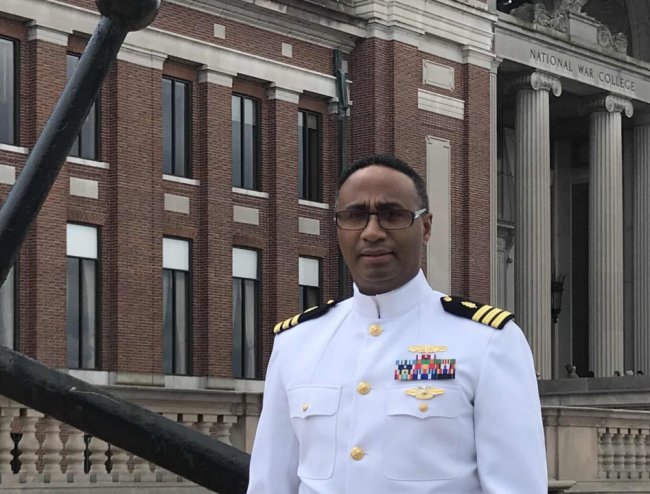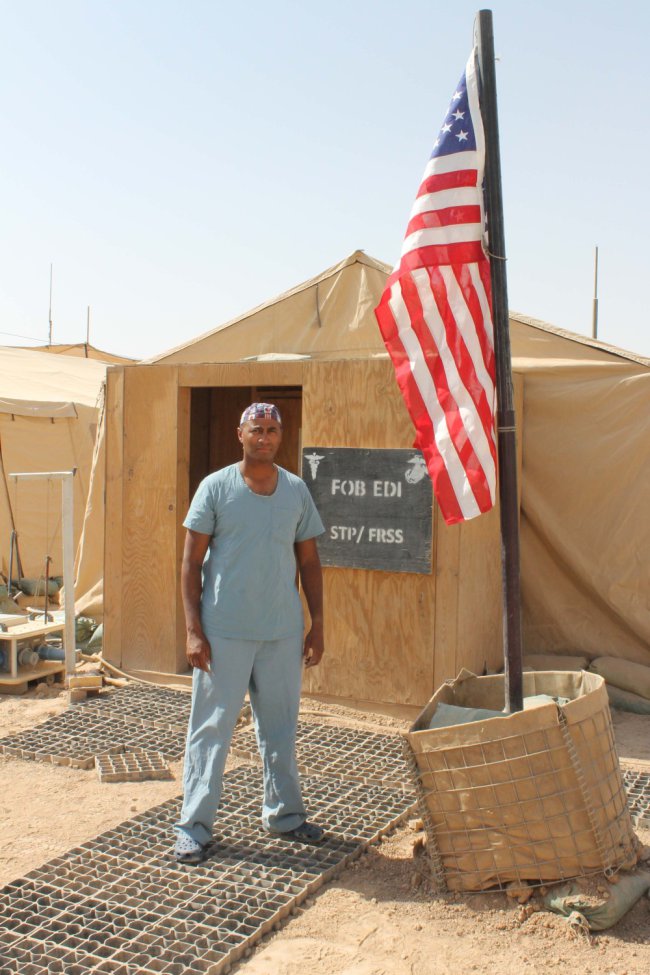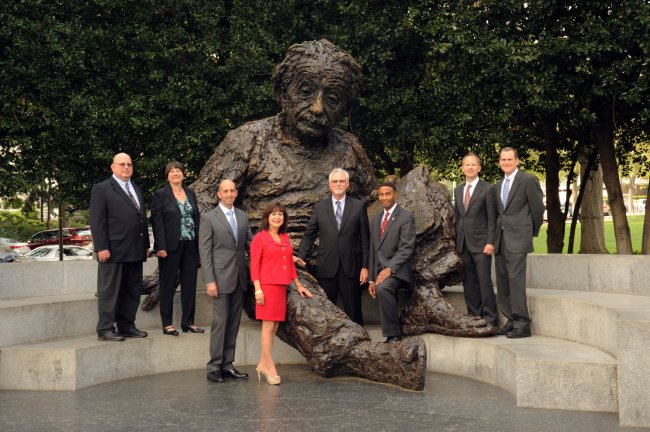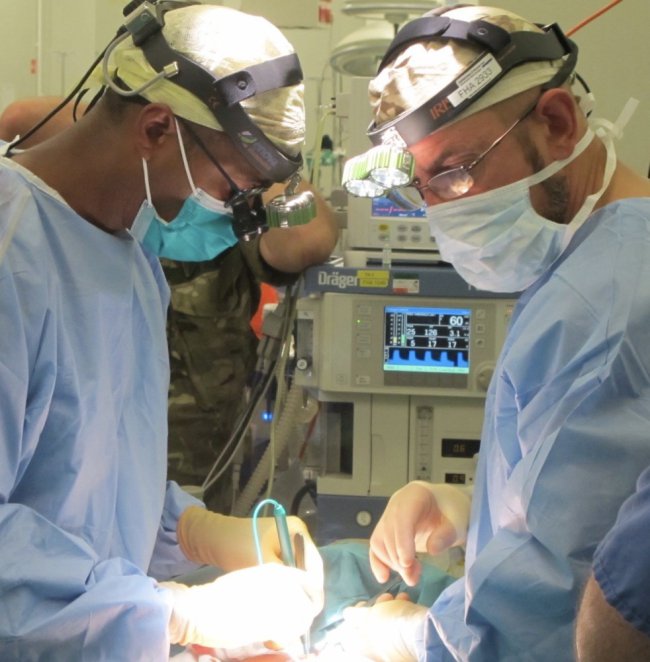Dr. Hassan Tetteh and the Art of Circling Back

2012-2013 RWJF Health Policy Fellow Hassan Tetteh outside the National War College in Washington, D.C. Photo courtesy Hassan Tetteh
“The RWJF Health Policy Fellows program takes you from being a really good checker player to being able to play four-dimensional chess.”
By Marisa Coulton
Cardiovascular and thoracic surgeon Dr. Hassan Tetteh became became a Robert Wood Johnson Foundation (RWJF) Health Policy Fellow in 2012, an experience that fundamentally altered his perspective on life, politics, and medicine, he said.
His path to the fellowship was far from linear, however.
His journey began at the State University of New York in Plattsburgh, where he majored in biochemistry. He planned to be a doctor. But another field had captured his attention: policy.
“I started to realize that activism… could actually make a difference in the situation of the students,” he said. Tetteh became president of the Black student union and vice president of the student association, experiences which gave him a good grasp of how policy worked.
He ran for student body president, and though he lost the race, a seed had been firmly planted. “In that process I found my voice,” he said.
One of his professors took notice of his passion for policy and suggested he apply to the ‘Kennedy School,’ which Tetteh had never heard of. When Tetteh looked into it and realized it was in fact the Kennedy School of Government at Harvard University, he decided against it. “I thought that was a little bit too much of a reach so I never applied,” he said.
But he did make note of the Harvard Kennedy School in his journal.
Tetteh has been journaling consistently since 2000 and has filled nearly 100 paperback notebooks with his thoughts. “I [often] go back and look at my notes, and that introspection is really important,” he said. “If something doesn’t go right, or it doesn’t go according to plan, I very deliberately take inventory on what happened.” Tetteh makes note of what he has learned from a particular situation and what he plans to do about it, he said.
Having a written history of his life enables him to revisit old ideas and circle back to the things that matter most. “I could see over the arc of time that… if I persisted and I didn’t give up, then each one of the disappointments would become something good,” he said.
This is perhaps why Tetteh applied to the Harvard Kennedy School many years after he had first learned about it. By then, he had completed medical school and was well into his career as a cardiovascular and thoracic surgeon in the military.
He got in. At Harvard, he learned about the RWJF Health Policy Fellows program for medical professionals looking to break into the public policy space.
He applied to join the RWJF Health Policy Fellows 2010-2011 cohort and was accepted. But life had other plans for him; the military deployed him to Afghanistan for seven months. At the time, the military was in desperate need of surgeons.

Tetteh in front of an operating room tent in Afghanistan. Photo courtesy Hassan Tetteh
Tetteh went abroad, leaving behind his wife and two young children. He journaled about his disappointment; he had really wanted to do the fellowship.
This wasn’t the first time he had been deployed overseas; he had been to the Middle East and Africa and had spent two years on an aircraft carrier, and sailed around the world. But Afghanistan was different.
“It was a very challenging time for the men and women fighting there,” Tetteh said. “Many of them were sustaining very devastating injuries,” adding that “many people don’t… recognize how severely injured and wounded people came back, not only physically, but mentally as well.”
Having trained as a surgeon in Brooklyn, New York, Tetteh was no stranger to treating gun and knife injuries. But this was much worse. “To see young men and women with no legs and no arms… and taking care of them in a tent with no electricity, no plumbing, no running water… it changes one’s life.”
While in Afghanistan, Tetteh kept up his journaling habit. He worked to maintain his characteristic optimism, his unwavering faith in “the ability for the universe to write itself.”
When he returned from Afghanistan, “I was in a different place in my life, certainly; I had a different experience and a different worldview.” It was time to circle back to the RWJF fellowship, he decided.
He reapplied and was accepted, this time for the 2012-2013 cohort.
The program offered a welcome change of pace, Tetteh said. “Physically, emotionally, I was exhausted… it was refreshing to start a new journey with this fresh cadre of colleagues that I, to this day, still call great friends.”
The fellows were a diverse political and professional mix, hailing from a range of backgrounds: anesthesiologists, family doctors, surgeons, and more. They were all passionate people. Good people, Tetteh said. To this day, he still keeps in touch with many of the fellows and frequently contacts them to get their opinions on personal and professional matters alike.
Tetteh learned as much from his cohort as he did from the fellowship itself. One of the fellows introduced him to ‘clinical informatics,’ a field which mixes health care, information technology, leadership, and administration. The idea stayed with him long after the fellowship had ended, and Tetteh, as always, circled back, becoming the Chief Medical Informatics Officer for the Navy years later.
‘A small difference in Washington’
The fellowship showed Tetteh just how complex the policymaking process in Washington can be. It’s not nearly as simple as it looks, he said. “Some things can just be done with the stroke of a pen. Other things are going to have to have consensus-building… If you don’t understand that process, nothing is going to happen.”
During the fellowship, Tetteh had the opportunity to work in the Congressional Budget Office (CBO), a federal agency. His research was included in a list of budget options that was ultimately presented to Congress. “I was looking through that list, and I was like, ‘Those are the things that I put together!’” he said. He realized then that he was “really doing something big.”

The 2012-2013 class of RWJF Health Policy Fellows.
His medical expertise was essential to the day-to-day operations at the CBO. When, for example, his CBO colleagues complained that health care costs were getting too high, Tetteh argued that heart surgery was indeed expensive, but rightfully so.
He went so far as to bring his colleagues into the operating theater so they could watch heart surgery in action, from the moment the doctors stopped the patient’s heart to the moment they got it beating again.
His colleagues said it was one of the most amazing things they had ever seen. “It could be your mom or your dad or your uncle or your sister [on the operating table],” Tetteh said, “and you know when it’s one of those people, you’re not going to care how much it costs; you are just going to want it done.”
Witnessing the procedure in action likely had a lasting impact on the way the CBO formulated medical budget recommendations. “A small difference in Washington [is] a big difference for the rest of the nation,” Tetteh said. “That was my small difference: introducing a [new] perspective.”
After the fellowship, Tetteh was a changed man. He came away from the program with a much deeper understanding and appreciation of politics, process, and the world of government. He was a better critical thinker and communicator, he said, and paid closer attention to what he said and how it could be perceived.
The program teaches fellows how to navigate the dynamics of human nature and politics, Tetteh said, and how to present their ideas to others in a collaborative, effective, and non-confrontational manner. “The RWJF fellowship takes you from being a really good checker player to being able to play four-dimensional chess,” he summarized.
After the fellowship, Tetteh began to climb the ranks of military medicine. He was assigned to the Bureau of Medicine and Surgery (BUMED) at Navy Medicine headquarters, where he served as the health policy advisor to the Surgeon General, and to the Navy Medicine leadership.
In just over a year, he had gone from being a surgeon in the military, to influencing the policies that governed all military surgeons.
In his new role, Tetteh was once tasked with developing a presentation which outlined how the proposed National Defense Authorization Act (NDAA) policy change would affect the bureau’s operations. Thanks to the fellowship, he now had the expertise not just to do it, but to do it well.
He quickly realized that the policy change was going to have a bigger impact on BUMED than the department thought, and informed his superiors that “there [was] a change coming that [was] going to rock Navy Medicine to its core,” he said. “[My team and I] pointed out that the new policy was going to impact the way that our leaders were able to lead, their effectiveness, and also how much authority they were going to have in the organization moving forward for all military medicine and… Navy medicine.”
The presentation was one of his “crowning achievements,” Tetteh said, and would go on to form the basis of a new navy and military medical strategy. It resulted in his promotion to Navy captain the following year.

Tetteh performing a surgical procedure. Photo courtesy Hassan Tetteh
Today, Tetteh is working on a few projects. For one, he’s working to introduce veterans to the practice of transcendental meditation, which he found has helped his mental health following his deployments. He retired from the military in August 2023, which has been bittersweet, he said.
He also founded a successful organ recovery practice called Specialized Thoracic Adaptive Recovery Teams, or STAR, tasked with recovering organs for heart and lung transplant centers. He grew the practice and sold it in 2021. During its tenure, Tetteh and his team recovered over 1,000 hearts and lungs.
He serves on three boards: The David Lynch Foundation, Mentoring in Medicine, and the Arthur Ashe Institute for Urban Health, and has written several bestselling books.
Tetteh founded HumanCare Technologies Inc. with the aim of bringing artificial intelligence solutions to civilian health care, and is working on a new book, “Smarter Healthcare with AI: Exploring the art of the possible through military applications of AI” in collaboration with Forbes Books.
The sky is the limit for Tetteh. He dreams of one day becoming the Secretary of Health and Human Services, the head of the United States Department of Health and Human Services and principal advisor to the president of the United States on all health matters.
Not now. But knowing Tetteh, he’ll probably circle back to it.
If you’ve been considering the Robert Wood Johnson Foundation Health Policy Fellows Program, now’s the time to circle back to it. The application period for the 2025-2026 class of RWJF Health Policy Fellows is open August 1-November 1, 2024. Learn more at HealthPolicyFellows.org.
Follow the RWJF Health Policy Fellows program on LinkedIn or email info@healthpolicyfellows.org to get in touch.
About the author: Marisa Coulton is a journalist based in Toronto, Canada. She holds a Master of Journalism and a Master of International Affairs from Columbia University.
